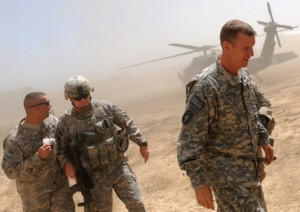Pakistan: Fallout From a Report of U.S. Attacks
February 18, 2009 | 2223 GMT
A Predator UAV
Summary
A Feb. 18 British media report says that the United States is launching attacks in Pakistan from Pakistani soil. Regardless of the report’s accuracy, the idea of U.S. forces using Pakistani soil for air and other operations will rouse emotions in Pakistan, something radical Islamists can exploit.
Analysis
The United States has been launching unmanned aerial vehicle (UAV) attacks on al Qaeda and Taliban targets in northwestern Pakistan’s Federally Administered Tribal Area (FATA) from Shamsi airfield in southwestern Pakistan’s Balochistan province, some 190 miles southwest of the city of Quetta near the borders with Afghanistan and Iran, for at least a year, British daily The Times reported Feb. 18.
The Times cited U.S. orders for fuel to the base, runway lengths and local witnesses who said they had seen UAVs taking off as evidence. A photo backing up the claim, apparently from Google Earth, copyrighted 2006 shows the distinctive shape of three UAVs — either MQ-9 Reapers or RQ-1 Predators — parked on the tarmac at Shamsi. While Pakistan operates its own fleet of smaller UAVs (none with the distinctive shape and wingspan of the Predator/Reaper design, however), Western sources and Pakistani officials reportedly confirmed to the British daily that the United States has launched UAV strikes on targets in Pakistan from Pakistani soil.
MAP: U.S. Air Bases in Afghanistan/Pakistan
Washington has used Pakistani air bases off and on since December 2001 in connection with the invasion of Afghanistan, so there is nothing new in the reports that the United States is using Pakistani soil for operations. In fact, Stratfor has been discussing covert U.S. military activity in Pakistan for several years. A Feb. 12 statement from U.S. Sen. Dianne Feinstein kicked off the latest frenzy of reporting on the subject. Feinstein expressed surprise over Pakistani opposition to the campaign of Predator-launched CIA missile strikes against Islamist militants in Pakistan’s northwestern region, saying, “As I understand it, these are flown out of a Pakistani base.”
We approach these reports with skepticism, as the British media at times has exaggerated covert U.S. military operations. Moreover, reports that the UAVs photographed in Balochistan province are RQ-4 Global Hawks are inaccurate. The wingspan of a single Global Hawk is twice as wide as that of a Predator. In short, the reports coming out today are unsurprising, and inaccurate in certain particulars.
Undisputedly, however, the reports have further riled up the Pakistani government and public. Even before the story surfaced, military and civilian leaders had spoken out against — and called for a halt to — U.S. airstrikes in FATA under pressure from national sentiment. The tremendous public anger at Pakistani decision-makers for allowing what are seen as violations of the South Asian country’s sovereignty is matched by strong opposition reservations within the country’s powerful security establishment to U.S. operations, even though Islamabad officially rejects the claims that it has agreed to U.S. airstrikes.
Politically, accusations that U.S. forces not only are striking at targets in Pakistan but also are launching aircraft from Pakistani bases will cause more trouble for the government in Islamabad, which has become as unpopular as its predecessor. Already weak due to an array of internal and external pressures, Islamabad now will face even more criticism over these allegations as well as subsequent instability. Nationwide protests planned by lawyers for March 9 could escalate beyond demands to reinstate judges, including former Chief Justice Iftikhar Mohammad Chaudhry, into outright grievances against the government, especially on the issue of territorial sovereignty.
Meanwhile, al Qaeda and the Taliban use reports like these to manipulate Pakistani popular sentiment, which could facilitate additional attacks against military installations (regardless of whether they house U.S. personnel). Jihadists as well as other radical Islamist forces have successfully argued that the Pakistani military is facilitating U.S. attacks against Pakistanis, and thus accuse it of being complicit in what is perceived as an American war against Islam and Muslims. This could also make U.S. personnel in Pakistan increasingly likely to be targeted, and the larger formations the Taliban has begun operating in could be a significant concern for a small U.S. contingent at a remote airfield.
If the United States is indeed using Pakistani air bases to carry out predator strikes, security might be an increased concern. While it would be impossible for the United States to operate such bases in total secrecy, it obviously is in their best interests to keep a low profile. The Pakistani military would have to know about the bases, and would be in charge of providing perimeter security for the areas. Between locals susceptible to ideological arguments and militant intimidation, perhaps leading to compromised military security, an attack could well be mounted on installations suspected of serving as bases for U.S. operations.





 Reply With Quote
Reply With Quote





Bookmarks